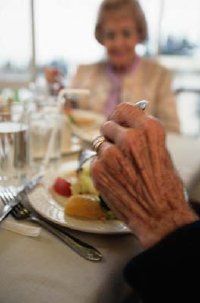Everyone knows that as they age, they should expect more aches and pains. What most people don't realize, however, is that there are natural herbal remedies that help relieve the pain of arthritis associated with getting older.
About Arthritis
This painful and debilitating joint disease is usually either classified as osteoarthritis (OA) or rheumatoid arthritis (RA).
Advertisement
OA is a condition in which the cartilage of the joints slowly deteriorates and hardens. Bone spurs often form in the area of the joint, resulting in deformity and limited mobility. Inflammation is not present or is minimal. OA most commonly affects those age 65 and older.
Unlike OA, RA is characterized by inflammation of the membranes surrounding joints; they become tender and swollen. It is an autoimmune disorder, which means that the body's immune system is attacking its own tissues. RA most often strikes people between the ages of 20 and 40, crippling more women than men. RA often attacks joints in a symmetrical fashion, e.g., both hands or both knees. Joints can become deformed.
Herbal Remedies for Arthritis
Horsetail's cornucopia of minerals, including silicon, may nourish joint cartilage. Ample amounts of tissue-building minerals in your daily diet will keep bones healthy and may help prevent bone spurs, a common complication of arthritis. Researchers have reported that people with RA who follow a predominantly lacto-ovo vegetarian diet (includes eggs and dairy products but no meats) for one year notice significant improvements.
In some people, arthritic conditions seem to be related to food allergies or sensitivities to common foods including wheat and dairy. Others believe that foods from the nightshade family, such as tomatoes, potatoes, and peppers, aggravate their condition, although others don't notice any connection. If you think certain foods play a role in your arthritis symptoms, it is important to put them to the test. Eliminate suspect foods for one week and nightshades for several months. Add eliminated foods back into your diet, one at a time, every four days. Note any reactions. During such trial and error times, be careful to keep eating a nutritionally balanced diet to support your body's healing efforts. It may be necessary to do a more extensive elimination or challenge to identify multiple allergenic foods. Consult a nutritionally oriented physician for guidance on how to attempt this safely and effectively.
These suggestionsare just the beginning. Go to the next page to learn more safe, effective herbal remedies for arthritis.
For more information about the subjects covered in this article, try the following links:
- To see all of our herbal remedies, visit our main Herbal Remedies page.
- To learn more about treating common medical conditions yourself, go to our main Home Remedies page.
- To learn more about conditions that can be treated with chamomile, read Chamomile Herbal Remedies.
- To find out more about how to prevent painful joints, read How to Prevent Arthritis Pain.
- Get more tips on how to get relief from arthritis when you read How to Relieve Arthritis Pain.
This information is solely for informational purposes. IT IS NOT INTENDED TO PROVIDE MEDICAL ADVICE. Neither the Editors of Consumer Guide (R), Publications International, Ltd., the author nor publisher take responsibility for any possible consequences from any treatment, procedure, exercise, dietary modification, action or application of medication which results from reading or following the information contained in this information. The publication of this information does not constitute the practice of medicine, and this information does not replace the advice of your physician or other health care provider. Before undertaking any course of treatment, the reader must seek the advice of their physician or other health care provider.Before engaging in any complementary medical technique, including the use of natural or herbal remedies, you should be aware that many of these techniques have not been evaluated in scientific studies. Use of these remedies in connection with over the counter or prescription medications can cause severe adverse reactions. Often, only limited information is available about their safety and effectiveness. Each state and each discipline has its own rules about whether practitioners are required to be professionally licensed. If you plan to visit a practitioner, it is recommended that you choose one who is licensed by a recognized national organization and who abides by the organization's standards. It is always best to speak with your primary health care provider before starting any new therapeutic technique.
Advertisement
